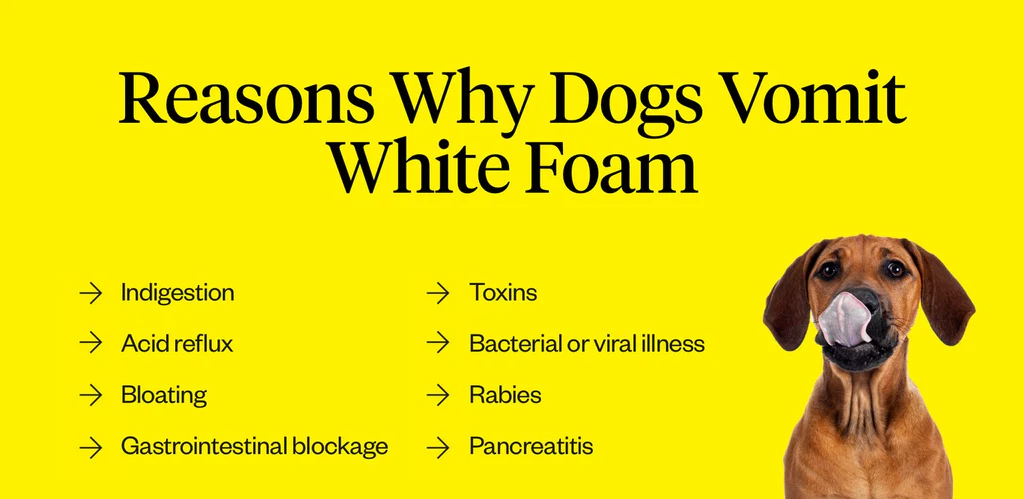Why is My Dog Vomiting White Foam? Causes and Solutions
As a dog owner, witnessing your beloved pet throwing up can be distressing. When a dog is vomiting white foam, it often raises concerns about their health. Understanding the potential causes behind this phenomenon and knowing when to seek veterinary care is crucial. In this article, we will explore the reasons why your dog may be experiencing vomiting and provide insights into appropriate solutions.
Possible Causes : Empty Stomach and Bile Production
One of the most common causes for a dog to vomit white foam is an empty stomach, which can lead to the production of bile. When a dog has not eaten for an extended period, the stomach continues to produce acid, which can irritate the stomach lining. This irritation may cause your dog to vomit white foam, as the bile mixes with air and stomach contents. This condition is often referred to as bilious vomiting syndrome, where the bile irritates the stomach and causes discomfort, prompting the dog to throw up white foam.
Dietary Indiscretion and Upset Stomach
Dogs are naturally curious and may consume inappropriate items, leading to dietary indiscretion. Eating something that doesn’t agree with them can upset their stomach, causing them to vomit white foam. This type of vomiting often occurs after a dog has eaten garbage or spoiled food, which can be harsh on their digestive system. Such experience can lead to nausea and ultimately result in foamy vomit. Keeping a close watch on your dog’s eating habits and ensuring they don’t consume harmful substances can help prevent this type of vomiting.
Infections and Gastrointestinal Disorders
Infections or gastrointestinal disorders are potential causes for your dog to vomit white foam. Conditions such as gastritis or pancreatitis can lead to irritation and inflammation in the digestive tract, resulting in foamy vomit. Additionally, parasites or viral infections can disrupt normal digestion, causing your dog to experience vomiting, diarrhea, and other serious symptoms. If you suspect your dog is experiencing vomiting due to an infection or gastrointestinal issue, it is crucial to seek veterinary care immediately for appropriate treatment and diagnosis.
Tips to Reduce the Risk of Vomiting White Foam

• Identify possible causes of vomiting in your dog.
• Ensure your dog receives a balanced diet to prevent vomiting foam.
• Keep your dog hydrated to reduce the risk of dog vomiting white foam.
• Avoid giving your dog table scraps to minimize dog vomit.
• Regular vet check-ups can help detect underlying issues causing vomiting of white foam.
• Monitor your dog for signs of coughing or vomiting white foam.
• Limit your dog’s exposure to toxins to prevent vomiting up white foam.
Identifying Serious Symptoms
Identifying serious symptoms is crucial, especially if your pet experiences stomach acid issues. If white foamy vomit or white foam vomit is accompanied by other symptoms like lethargy, it could be serious.
Conditions that cause vomiting might mean your pet may vomit white foam. In such cases, it’s best to withhold food and consult a vet immediately for an accurate diagnosis.
Understanding the Severity of Symptoms
When you see your dog exhibiting unusual behavior, it’s crucial to assess the severity of symptoms. If your dog might be throwing up, especially if they might be throwing up white foam, it could indicate a serious issue. Including white foam in their vomit can be a sign of severe vomiting that requires prompt veterinary attention.
Common Causes of Dogs Throwing Up White Foam
Vomiting white foam in dogs can occur for several reasons. Often, eating too fast leads to digestive upset and subsequent vomiting episodes. Additionally, repeated vomiting can irritate the stomach lining, causing dogs to expel frothy material. It’s essential to understand what the foam means to address the underlying issue effectively.
Establishing a Healthy Diet

Establishing a healthy diet is crucial for preventing vomiting in dogs. Choose high-quality dog food that is appropriate for your pet’s age and health needs. Incorporating fiber-rich foods can aid digestion and reduce the likelihood of gastrointestinal upset. Moreover, make sure your dog has a balanced intake of nutrients, including protein, fats, and carbohydrates. Keeping your dog hydrated is also vital, as dehydration can exacerbate vomiting. Always consult your veterinarian to determine the best dietary plan tailored to your dog’s specific needs.
Monitoring Your Dog’s Behavior
Monitoring your dog’s behavior is an essential aspect of preventing vomiting. Pay attention to any changes in appetite, energy levels, or bathroom habits, as these can be indicators of underlying health problems. If you notice your dog acting lethargic or if they are experiencing diarrhea, it may signal that they are about to vomit. Keeping a close eye on your dog when they are outdoors can also prevent them from eating harmful substances that might lead to vomiting. Early detection of behavioral changes can help in seeking appropriate veterinary care promptly.
When to Seek Veterinary Care?
It’s crucial to seek veterinary care if your dog experiences occasional vomiting that persists. There are several potential reasons why your dog might vomit, including dietary indiscretions or infections. Always encourage your dog to drink water to prevent dehydration, but ensure your dog to drink small amounts at a time to avoid further stomach upset.
What to Expect During a Veterinary Visit?
When you take your dog to the vet for vomiting issues, you can expect a thorough examination. The veterinarian will likely ask about your dog’s symptoms, diet, and any recent changes in behavior. They may perform physical examinations to check for signs of dehydration or abdominal pain. Diagnostic tests, such as blood work or imaging, may be recommended to identify the cause of vomiting. This comprehensive approach helps ensure your dog receives the correct diagnosis and subsequent treatment for their condition.
Common Diagnostic Tests for Vomiting
Common diagnostic tests for dogs experiencing vomiting often include blood tests, X-rays, and ultrasound examinations. Blood tests can help identify infections, inflammation, or organ dysfunction that may be causing your dog to vomit white foam. X-rays can reveal any blockages or abnormalities in the gastrointestinal tract, while ultrasound provides a more detailed view of the internal organs. These diagnostic tools are essential for discerning the underlying causes of vomiting and formulating an effective treatment plan for your dog.




Post Comment